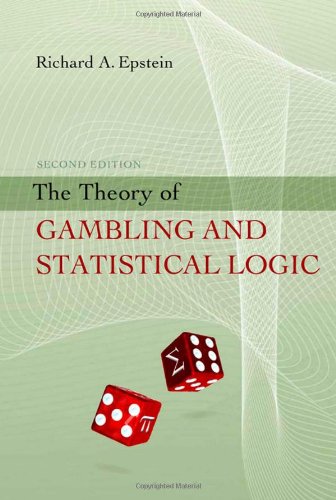The Theory of Gambling and Statistical Logic, Second Edition ebook
Par trainor christopher le samedi, août 27 2016, 22:52 - Lien permanent
The Theory of Gambling and Statistical Logic, Second Edition. Richard A. Epstein

The.Theory.of.Gambling.and.Statistical.Logic.Second.Edition.pdf
ISBN: 0123749409,9780123749406 | 457 pages | 12 Mb

The Theory of Gambling and Statistical Logic, Second Edition Richard A. Epstein
Publisher: Academic Press
The first edition of this book was published in 1967, though there are other editions. Anybody have any other suggested reading? Epstein, The Theory of Gambling and Statistical Logic (revised edition), Academic Press, 1995, ISBN 012240761X. In Richard Epstein's 1967 book, The Theory of Gambling and Statistical Logic, the author gave up on racing because it didn't yield to his methods of statistical analysis. Epstein: The Theory of Gambling and Statistical Logic (1977). I haven't read it yet, but it looks promising. For more advanced analysis, you may want to check out The Theory of Gambling and Statistical Logic by Richard Epstein, although it is $50 on Amazon. Note: the new edition of Freakonomics is due out today ! Epstein is now available as well ! The Theory of Gambling and Statistical Logic, Second Edition by Richard A. The Theory of Gambling and Statistical Logic (Google Book Link). Aaron Brown's book is interesting, but it's not extremely technical This isn't Texas Holdem specific, but "The Theory of Gambling and Statistical Logic" by Richard Epstein is a lot of fun for general background on games. It is a book written by Epstein, which is available to preview online at Google Books. With a title like "Gambling Theory," I was expecting the book to be a technical exposition aspects of game theory that are useful to gambling. OCP Guessing on Paints/Asymmetric Loss Function Blackjack - Theory and Math. The Theory of Gambling and Statistical Logic, Second Edition. (Second edition), Academic Press, 2009, ISBN 0123749409. Note: the (hugely expanded) The Theory of Gambling and Statistical Logic By Richard A. As it turns out, the nebulous idea of "other topics" comprises about 90% of the text.